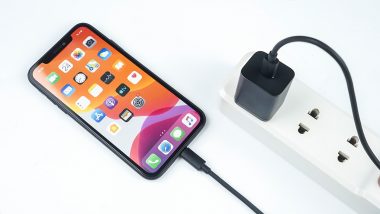New Delhi, March 30: The Centre has issued a warning to the citizens about the risks of using USB charging stations at public places such as airports, cafes, hotels, and bus stands. This comes in light of the “USB charger scam” where cybercriminals exploit these charging ports for malicious activities.
The primary threat involves a cyber attack strategy known as “juice-jacking”. In this scenario, cybercriminals use public USB charging stations to either steal user data or install malware on the connected devices. Online Fraud in Bengaluru: Elderly Man Falls Prey To Cyber Fraud, Ends Up Losing Rs 4.4 Lakh After Receiving Call From Fake Customer Executives From Healthcare Portal App.
To protect themselves, individuals are advised to:
- Use electrical wall outlets or bring their own cables or power banks for charging.
- Ensure their device is secure or locked and avoid connecting with unknown devices.
- Consider turning off their phone while charging.
What is Juice Jacking?
Juice jacking involves malicious individuals exploiting public charging stations, such as USB ports or charging kiosks, to steal data from or infect the devices of unsuspecting users. The term “juice jacking" is a play on words combining “juice," which is a slang term for electric power or energy, and “hijacking," indicating the unauthorised access to a device. Cyber Fraud in Pune: Fraudsters Dupe Chartered Accountant of Rs Three Crore in Online Investment Scam in Baner; Investigation Launched After Six Cases Registered in 48 Hours.
Readers must note that the charging port of a mobile can also be used to transfer files / data.
In the event of cyber fraud, incidents should be reported at www.cybercrime.gov.in or by calling 1930. It’s crucial to remain vigilant and prioritise safety when charging devices in public places.
(The above story first appeared on LatestLY on Mar 30, 2024 03:25 PM IST. For more news and updates on politics, world, sports, entertainment and lifestyle, log on to our website latestly.com).













 Quickly
Quickly




















